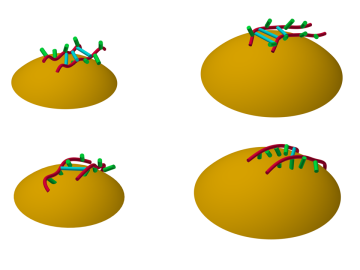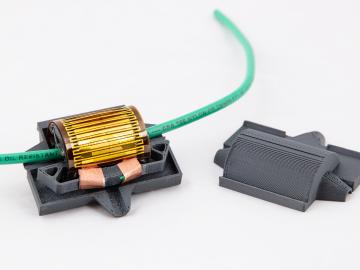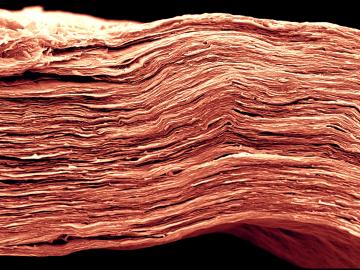
Filter News
Area of Research
- (-) Energy Science (111)
- (-) Materials (58)
- Advanced Manufacturing (5)
- Biology and Environment (26)
- Building Technologies (2)
- Computational Biology (1)
- Computational Engineering (2)
- Computer Science (8)
- Electricity and Smart Grid (1)
- Energy Sciences (2)
- Fusion and Fission (8)
- Fusion Energy (1)
- Isotope Development and Production (1)
- Isotopes (11)
- Materials for Computing (8)
- National Security (17)
- Neutron Science (26)
- Nuclear Science and Technology (8)
- Quantum information Science (2)
- Sensors and Controls (1)
- Supercomputing (34)
- Transportation Systems (2)
News Type
News Topics
- (-) Big Data (2)
- (-) Biomedical (6)
- (-) Cybersecurity (4)
- (-) Energy Storage (58)
- (-) Grid (25)
- (-) Isotopes (7)
- (-) ITER (1)
- (-) Physics (16)
- (-) Space Exploration (3)
- (-) Transportation (45)
- 3-D Printing/Advanced Manufacturing (60)
- Advanced Reactors (4)
- Artificial Intelligence (7)
- Bioenergy (19)
- Biology (8)
- Biotechnology (3)
- Buildings (21)
- Chemical Sciences (24)
- Clean Water (5)
- Composites (15)
- Computer Science (23)
- Coronavirus (7)
- Critical Materials (18)
- Environment (33)
- Exascale Computing (2)
- Fossil Energy (1)
- Frontier (2)
- Fusion (4)
- High-Performance Computing (5)
- Hydropower (2)
- Machine Learning (7)
- Materials (66)
- Materials Science (62)
- Mathematics (1)
- Mercury (2)
- Microscopy (18)
- Molten Salt (3)
- Nanotechnology (30)
- National Security (5)
- Neutron Science (27)
- Nuclear Energy (9)
- Partnerships (11)
- Polymers (16)
- Quantum Computing (2)
- Quantum Science (11)
- Security (3)
- Simulation (2)
- Statistics (1)
- Summit (3)
Media Contacts

Researchers at Oak Ridge National Laboratory proved that a certain class of ionic liquids, when mixed with commercially available oils, can make gears run more efficiently with less noise and better durability.

Electro-Active Technologies, Inc., of Knoxville, Tenn., has exclusively licensed two biorefinery technologies invented and patented by the startup’s co-founders while working at the Department of Energy’s Oak Ridge National Laboratory. The technologies work as a system that converts organic waste into renewable hydrogen gas for use as a biofuel.

A new method developed at Oak Ridge National Laboratory improves the energy efficiency of a desalination process known as solar-thermal evaporation.
A team of scientists led by Oak Ridge National Laboratory have discovered the specific gene that controls an important symbiotic relationship between plants and soil fungi, and successfully facilitated the symbiosis in a plant that

A team of researchers at Oak Ridge National Laboratory have demonstrated that designed synthetic polymers can serve as a high-performance binding material for next-generation lithium-ion batteries.

Scientists have discovered a way to alter heat transport in thermoelectric materials, a finding that may ultimately improve energy efficiency as the materials

Scientists at Oak Ridge National Laboratory have developed a low-cost, printed, flexible sensor that can wrap around power cables to precisely monitor electrical loads from household appliances to support grid operations.

Oak Ridge National Laboratory’s latest Transportation Energy Data Book: Edition 37 reports that the number of vehicles nationwide is growing faster than the population, with sales more than 17 million since 2015, and the average household vehicle travels more than 11,000 miles per year.


Oak Ridge National Laboratory scientists have created open source software that scales up analysis of motor designs to run on the fastest computers available, including those accessible to outside users at the Oak Ridge Leadership Computing Facility.


